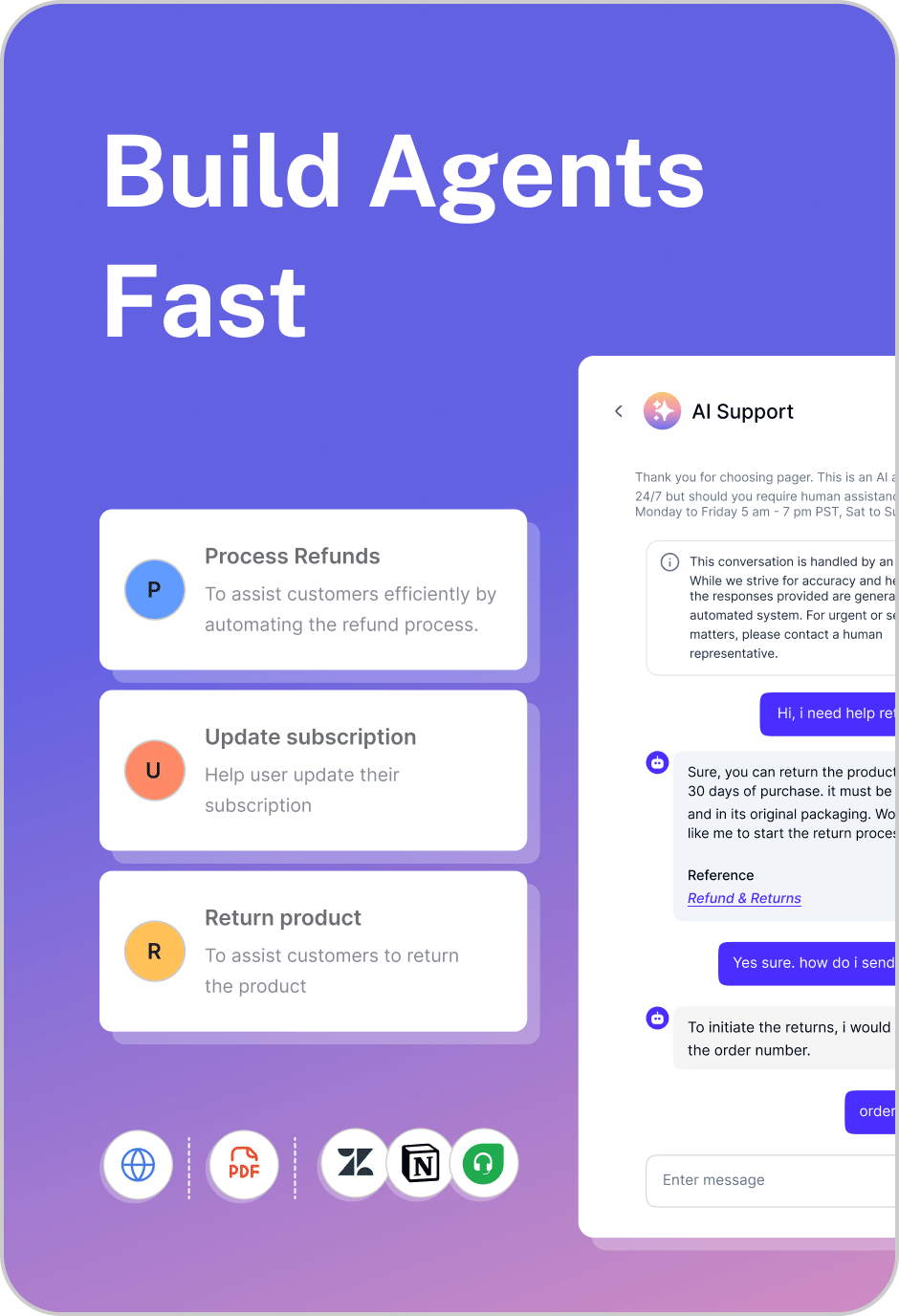
Decagon AI Reviews 2026: Features, Pricing, Pros, Cons & Best Alternative
Read Decagon AI reviews 2026. Explore its features, pricing, strengths, and limitations to see how it performs in customer support automation.
Keytakeaways
Decagon excels in enterprise automation : Programmable AOPs, omnichannel support, and Watchtower observability make it powerful for regulated industries requiring compliance and scale.
High costs limit accessibility : Annual contracts start at $95K–$590K+, making Decagon impractical for SMBs and startups seeking affordable AI automation.
Steep learning curve requires technical resources : Implementation demands Agent Engineers and weeks of setup, slowing time-to-value for non-technical teams.
pagergpt offers faster deployment and transparent pricing : No-code builder, plans from free to $349/month, 95+ languages, and enterprise security deliver ROI without complexity.
AI is no longer just about answering simple customer questions, it’s about delivering intelligent, human-like conversations that scale across every channel. In 2026, Decagon AI has positioned itself as one of the most ambitious players in this space. Unlike traditional chatbot platforms that rely on pre-built scripts and rigid flows, Decagon promises a new era of programmable AI agents that combine natural language understanding with code-level precision.
For enterprises and high-growth companies, the appeal is clear: reduce costs, scale customer support, and transform CX from a cost center into a strategic growth engine. But is Decagon truly the best choice for your business? Let’s break down the strengths, limitations, and user reviews on Decagon.
Let’s dive in.
What is Decagon?
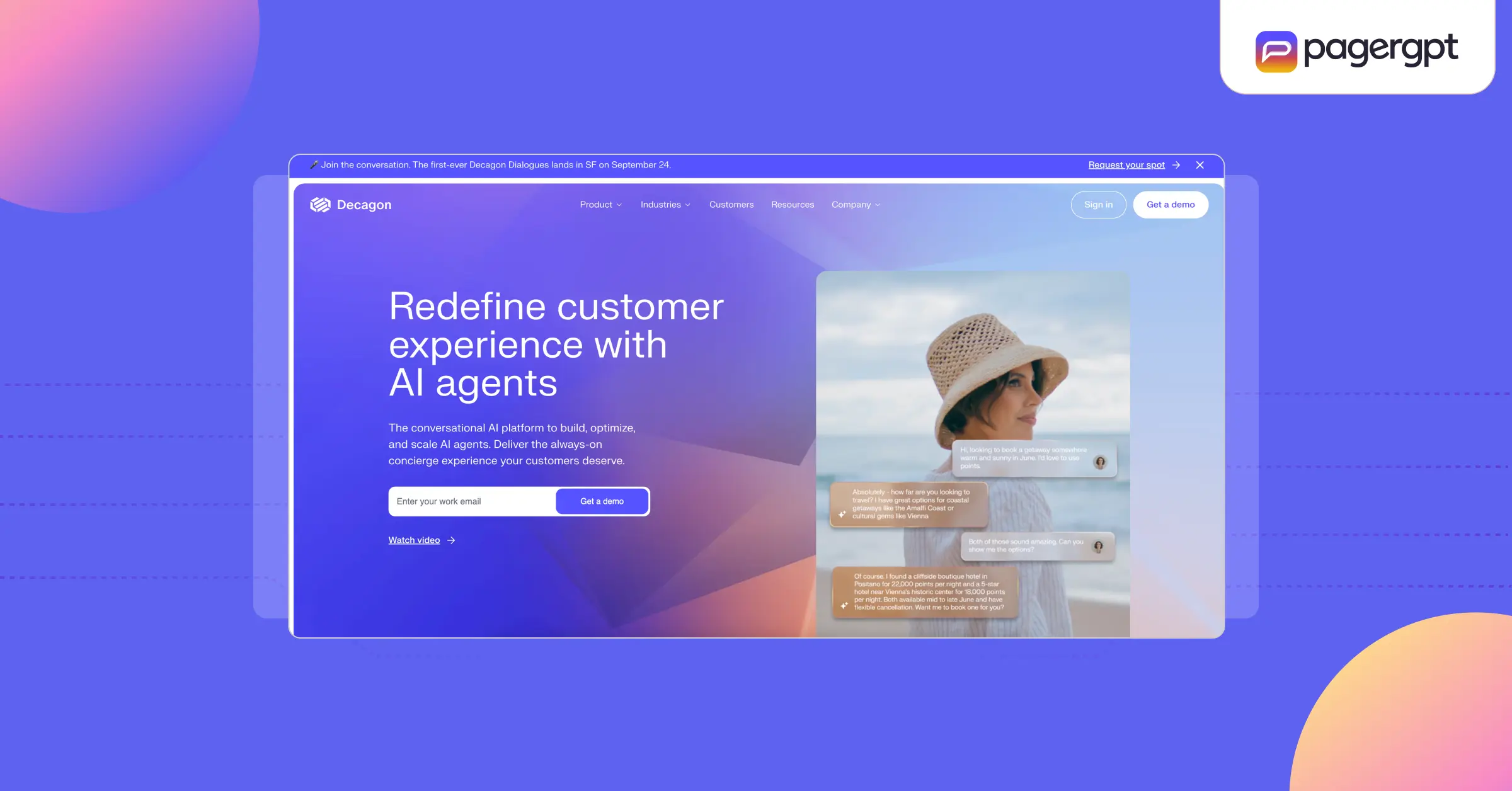
Decagon is a conversational AI platform designed to help businesses design, deploy, and scale intelligent agents for customer experience (CX). Unlike basic chatbots, it operates as a fully programmable architecture, where natural language instructions are compiled into agent-grade logic, providing CX teams with flexibility and precision at scale.
It positions itself as the next-generation AI agent platform. With capabilities spanning chat, email, voice, SMS, and APIs, Decagon aims to deliver concierge-level support experiences across every touchpoint.
In short, Decagon is built for enterprises that want fast, flexible, and scalable CX automation — with a focus on real-time resolution, omnichannel support, and measurable ROI.
Decagon Review (2026): What You Should Know
Let’s find out what the strengths are and limitations of Decagon from customers’ view point.
Speed and accuracy
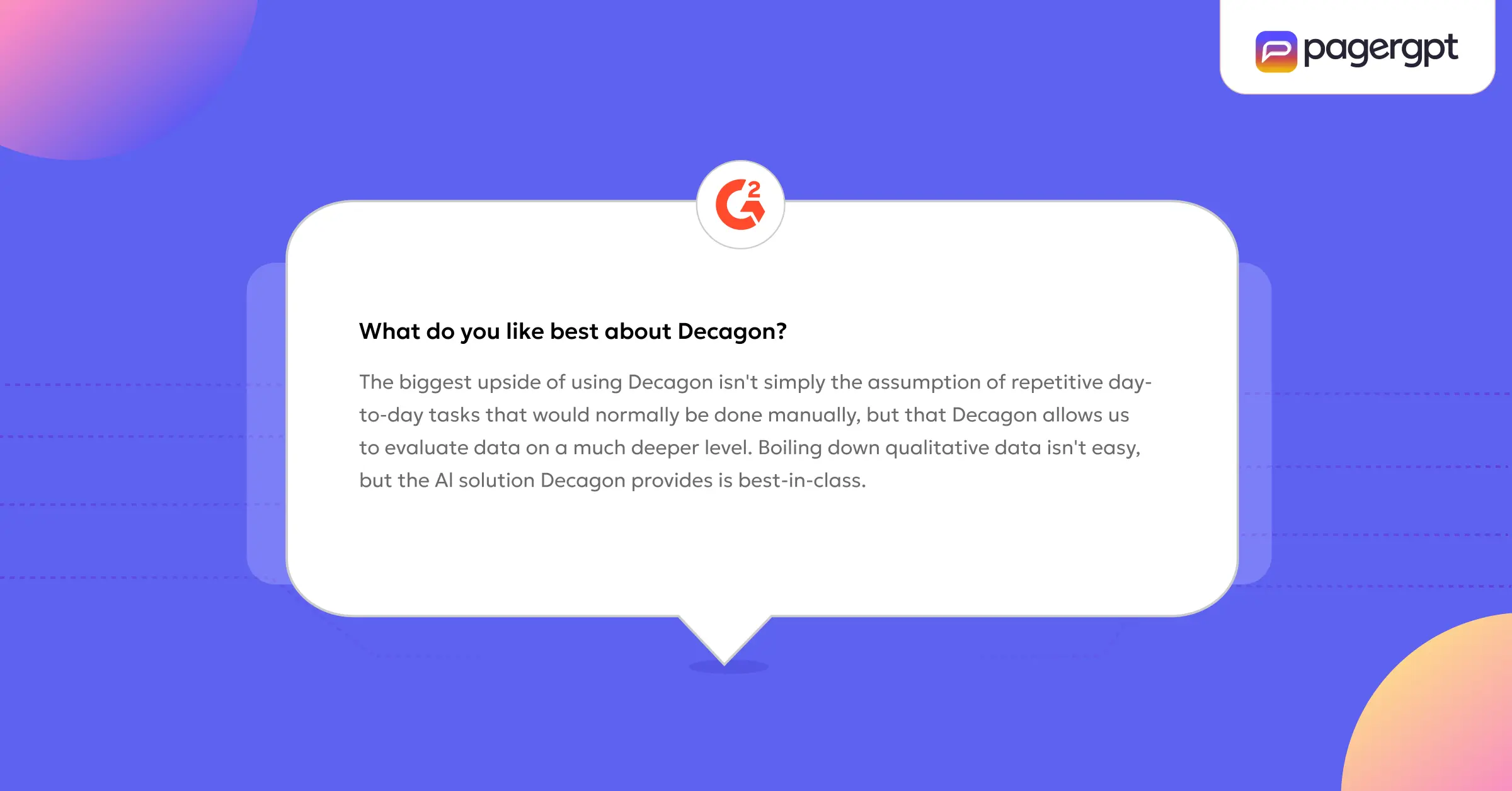
What users value most about Decagon is its ability to go beyond handling repetitive day-to-day tasks. Instead of just automating basic workflows, Decagon helps teams evaluate data on a much deeper level, making it possible to extract meaningful insights from complex, qualitative information.
This capability allows businesses to not only streamline operations but also make smarter, data-backed decisions. Many reviewers describe Decagon’s AI as best-in-class, highlighting its strength in transforming raw information into valuable outcomes that improve both efficiency and strategy.
Reliability and versatility
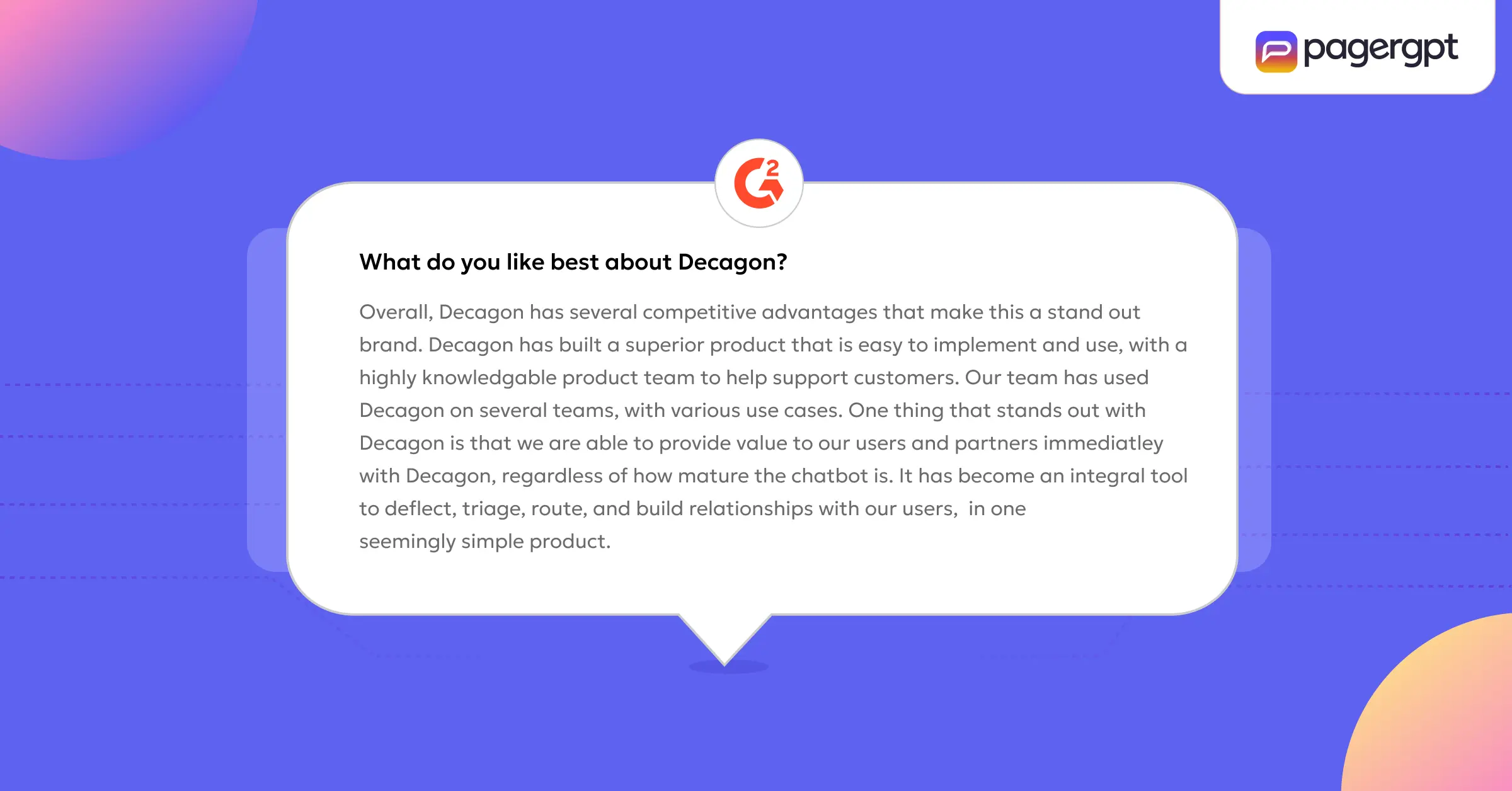
Decagon earns praise for being both easy to implement and highly versatile across different teams and use cases. Reviewers highlight the knowledgeable support team and the product’s ability to deliver immediate value, whether for deflection, triage, routing, or building stronger customer relationships.
Its seamless functionality allows organizations to integrate Decagon into their workflows quickly, making it an indispensable tool for delivering consistent and meaningful customer support at scale.
Agentic automation for customer support
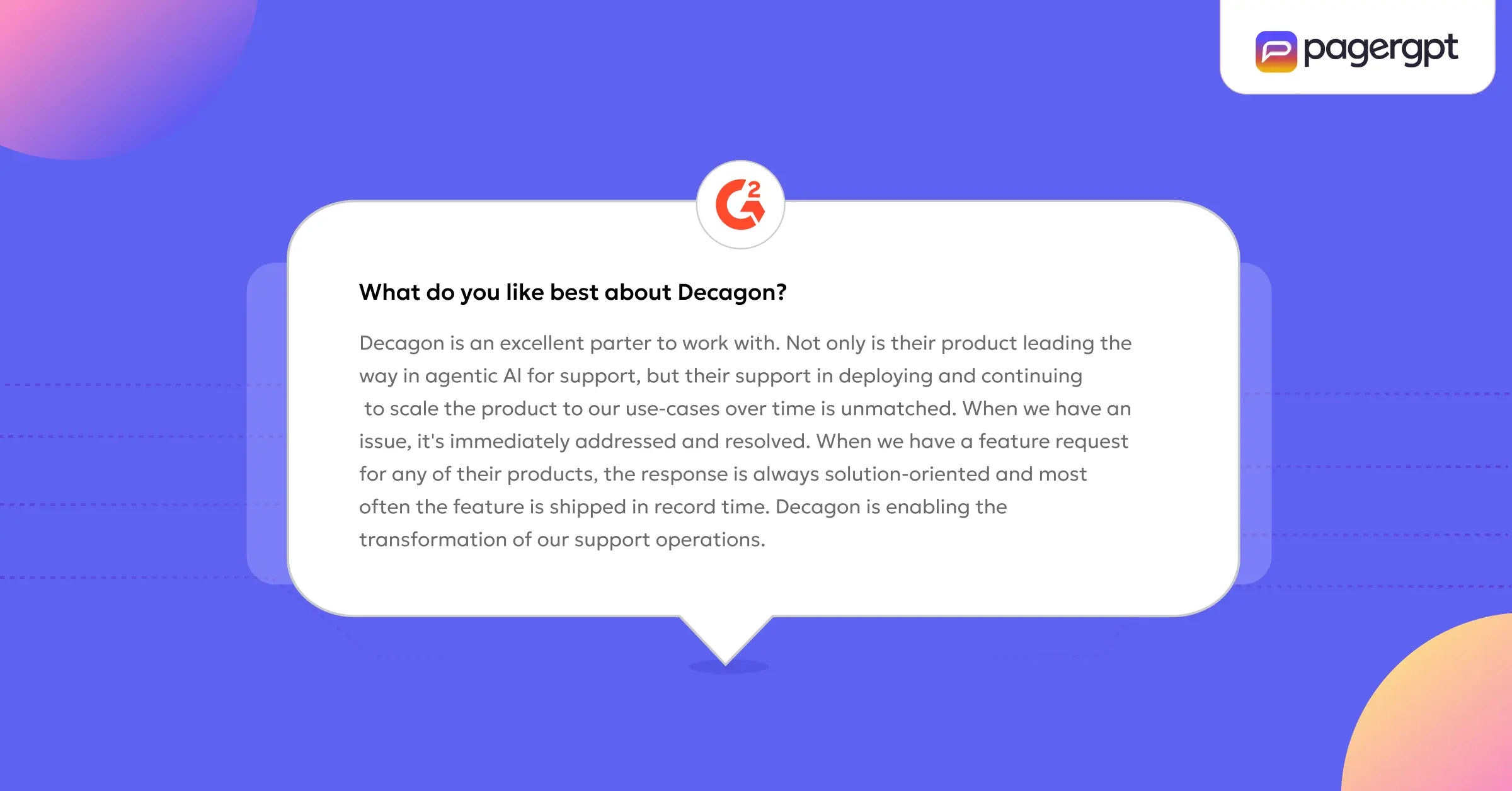
Its agentic AI for support is recognized as industry-leading, while the company’s commitment to deployment and ongoing scalability ensures it adapts well to evolving business needs. Users note that issues are addressed quickly and feature requests are handled with a solution-first approach, often delivered in record time.
By combining advanced technology with responsive support, Decagon is helping organizations transform their customer service operations and achieve long-term success.
Fast setup
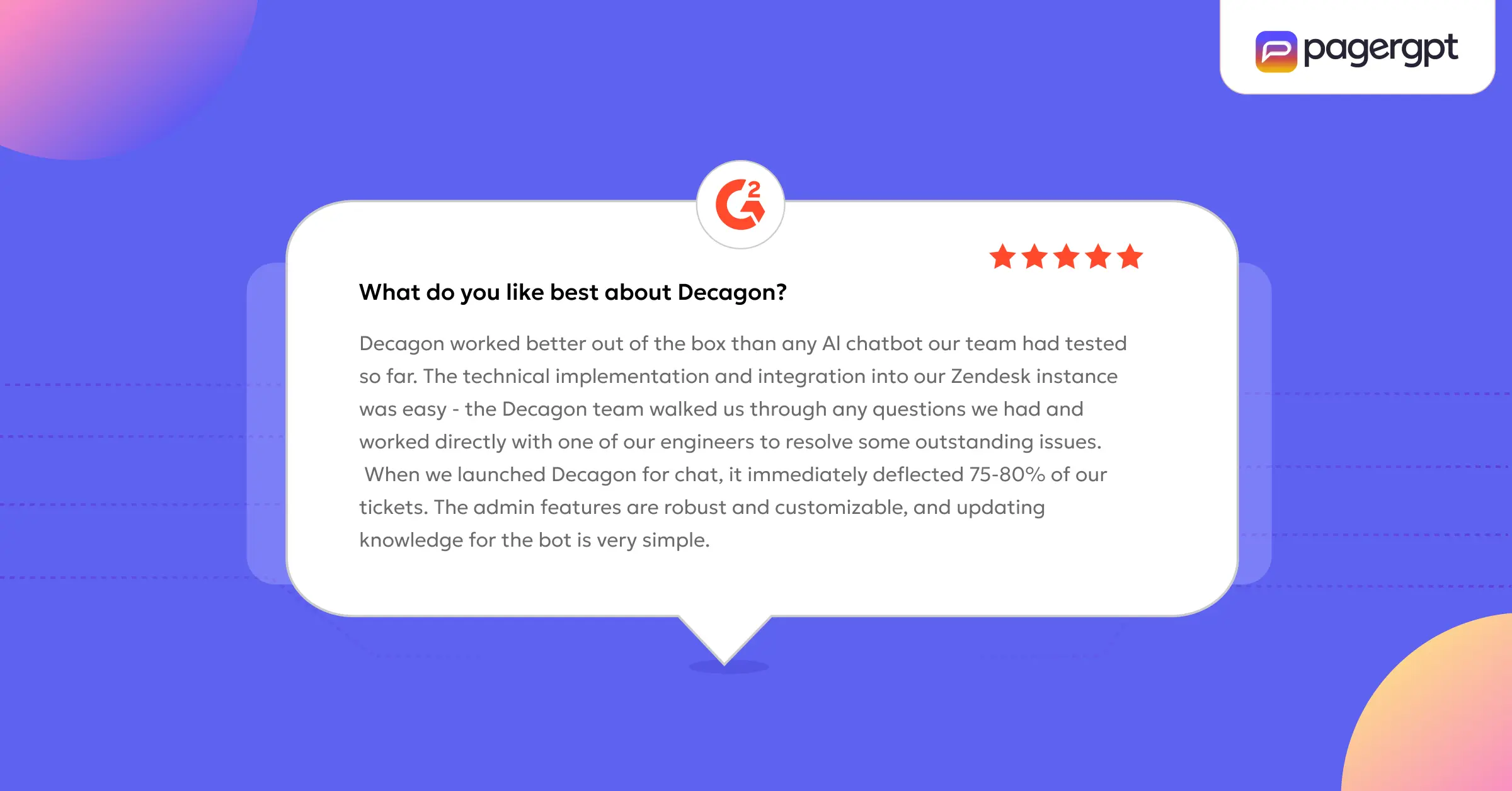
Decagon impressed users by working better out of the box than any AI chatbot they had previously tested. Integration with Zendesk was smooth, supported directly by the Decagon team, who guided the process and helped resolve technical questions quickly.
Once launched, Decagon immediately deflected 75–80% of support tickets, delivering measurable results from day one. Its robust admin features and simple knowledge management make ongoing customization easy, ensuring the platform continues to deliver long-term value.
Missing features
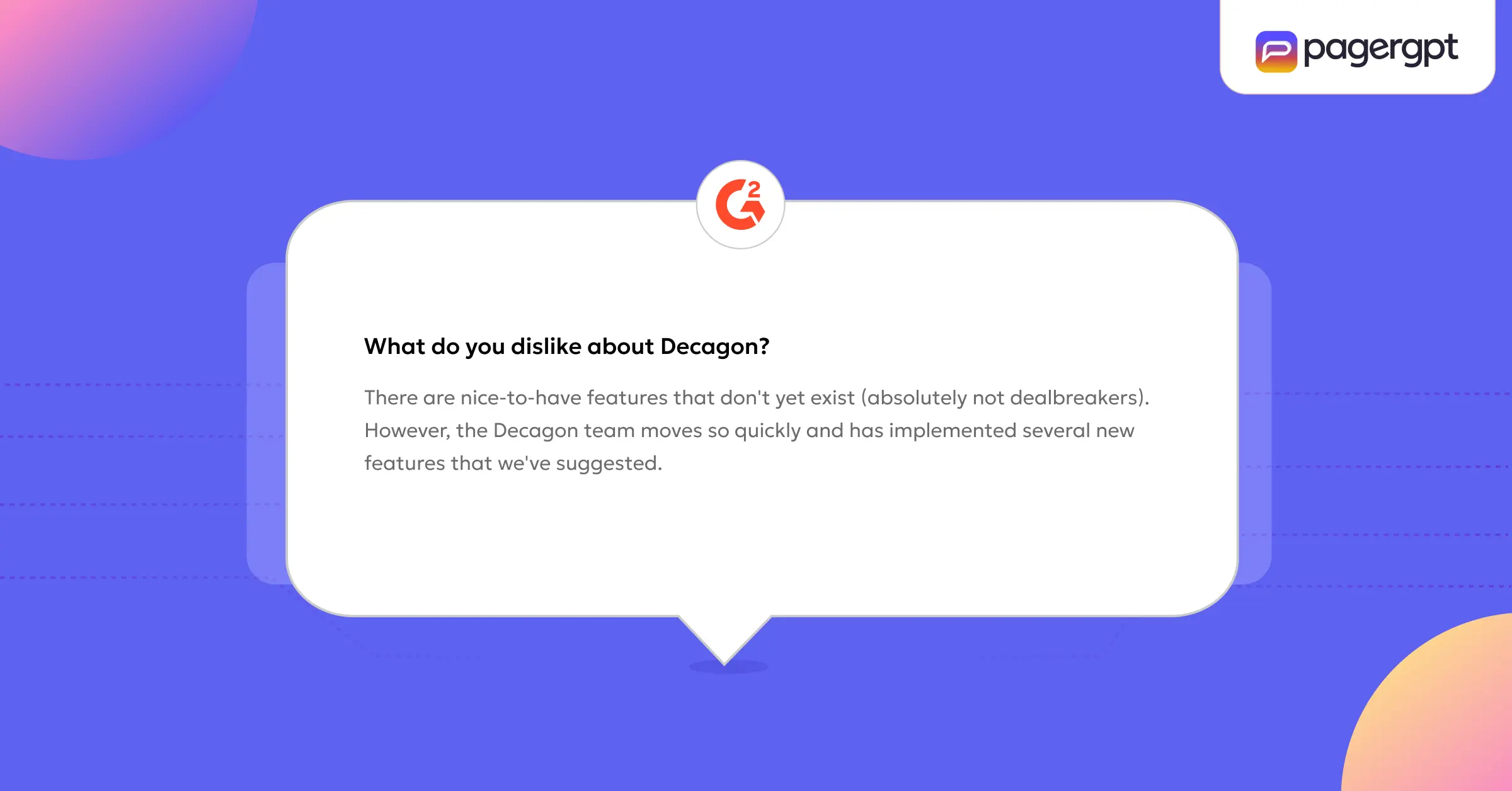
Some users note that Decagon is still missing a few “nice-to-have” features, though none of these are considered dealbreakers. What stands out is the speed at which the Decagon team responds to feedback—many suggested features have already been implemented in record time.
This responsiveness gives customers confidence that the platform will continue to evolve and quickly address any gaps, making Decagon a forward-moving solution for AI-powered support.
Limited agent feature
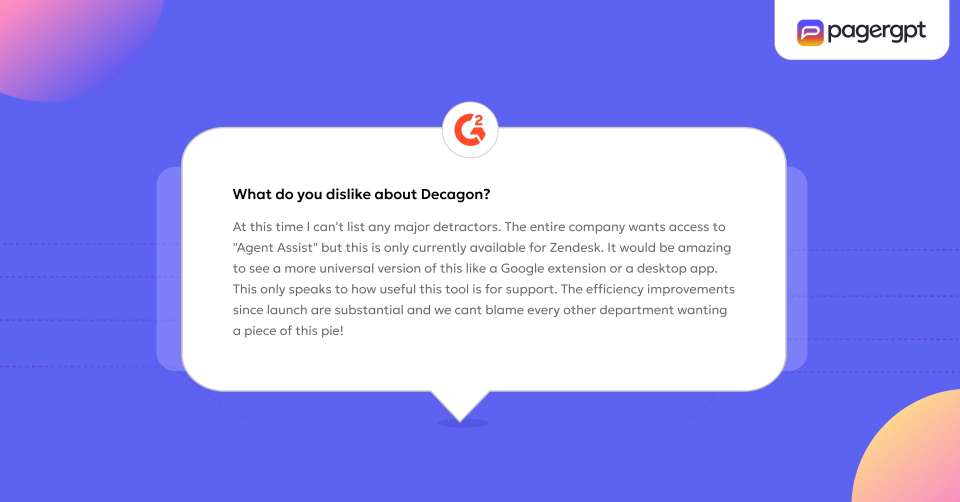
The only drawback users mention is that Decagon’s “Agent Assist” feature is currently restricted to Zendesk. A more universal option, like a Google extension or desktop app, would make it accessible to more teams across the company.
Early-stage feature
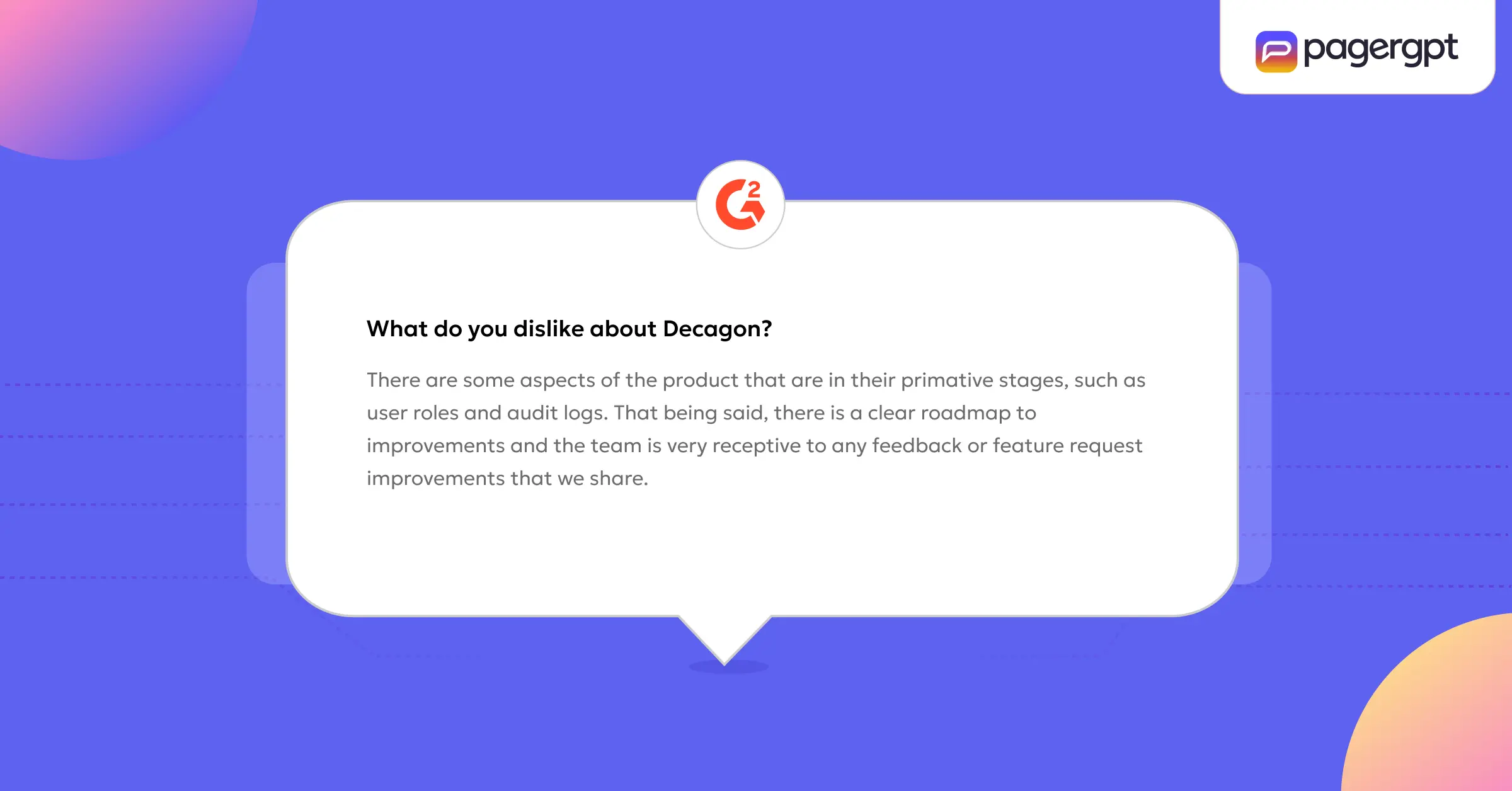
User roles are still basic, making it harder to set granular permissions for different teams. Audit logs lack depth, which can cause issues when tracing activity or ensuring compliance. Without advanced role management, delegating access safely across departments becomes challenging. Limited tracking makes it harder for developers to debug issues or maintain accountability in regulated industries.
Core Features of Decagon AI
Decagon AI is not just another chatbot—it’s a fully programmable AI agent platform. Its features are designed to give CX and operations teams the ability to deliver high-quality, real-time, omnichannel support while maintaining enterprise-grade control. From natural language programmability to omnichannel deployment and built-in observability, Decagon blends the flexibility of generative AI with the structure needed for large-scale automation.
Agent operating procedures (AOPs)
Natural language instructions are compiled into code-level logic.
CX teams can create and modify workflows quickly, without depending on rigid developer-heavy systems.
Decagon enables fine-grained control over how agents respond and act, reducing the need for third-party services.
Unified omnichannel engine
One platform to manage chat, email, voice, SMS, and even custom API surfaces.
Customers receive a consistent experience regardless of the channel they use.
Decagon eliminates fragmentation across tools and creates a single source of truth for support automation.
Built-in observability with Watchtower
With Decagon, the customer support team can get visibility into how AI agents make decisions.
Critical for debugging, auditing, and ensuring compliance with organizational standards.
Decagon gives CX leaders confidence that automation is running safely and transparently.
Agent assist
AI-powered copilots embed directly into agent workspaces to support human agents with smart suggestions, rather than replacing them.
With draft and adapt responses, agents can generate quick replies and refine them to match tone, brand voice, and customer context.
One-click efficiency provides instant automated suggestions for replies, workflows, and ticket handling.
Enterprise-grade guardrails
Includes governance controls, role-based access, and data privacy protections.
Integrates securely with enterprise systems, ensuring regulatory compliance.
Helps avoid AI “black box” concerns by enforcing safe operating boundaries.
AI-optimized performance
Powered by a unified knowledge graph that learns from interactions over time.
Continuously improves accuracy, reduces hallucinations, and provides context-aware answers.
Ensures better resolution rates with fewer escalations to human agents.
Pros and cons of Decagon
Pros:
Highly responsive customer support and implementation : Users frequently praise Decagon’s support and onboarding teams for their expert, collaborative approach. One remarked:
Fast implementation : Many customers report seamless setup and instant impact. One reviewer shared that “Decagon worked better out of the box… it immediately deflected 75–80 % of our tickets.”
Advanced AI integration and deep automation : Decagon excels at integrating with backend systems to automate complex workflows like refunds, order updates, and more far beyond simple chat responses.
Context-aware, human-like conversations : Its AI agents maintain continuity and understand context across messages, giving customers an intelligent and seamless experience.
Insightful analytics and governance tools : Built-in dashboards and observability tools (e.g., Watchtower) provide actionable insights and traceability—a key benefit for enterprises needing audit-ready platforms.
Scalable performance for high-volume environments : Especially for regulated industries, Decagon supports complex workflows at scale, offering enterprise-grade robustness.
Cons:
High cost and enterprise-only pricing : Annual pricing typically starts from around $95,000 and can exceed $590,000—making it inaccessible for smaller businesses.
Complex, engineering-heavy setup : Implementation often requires dedicated “Agent Engineers” and can stretch into weeks or months, posing a barrier for teams without deep technical resources.
Opaque, unpredictable pricing : Decagon’s usage-based models (per conversation or per resolution) lack baseline rates or usage thresholds, making forecasting costs challenging.
Steep learning curve for ongoing management : Users note that the platform requires careful monitoring early on to fine-tune AI behavior, slowing time to full ROI.
Missing usability features and customization limits : Some users flagged the lack of filters, scheduled syncs, and limited self-service options—suggesting enhancements would improve productivity.
Feature access limitations on specific platforms : Certain functionalities like Agent Assist—are only available on platforms such as Zendesk, restricting flexibility.
Not optimized for smaller teams or low support volumes : For organizations without complex workflows, the platform may feel like overkill—a heavy investment for basic use cases.
Use case of Decagon
Decagon is designed to power intelligent automation in high-scale, multi-channel environments. Its architecture supports complex workflows where consistency, compliance, and personalization are essential.
Key use cases:
Customer onboarding journeys – Automating step-by-step setup processes for new users.
Refunds and payment resolution – Handling disputes, refunds, and payment updates without human intervention.
Order and delivery management – Providing real-time updates on orders, shipping, and returns across channels.
Identity verification and security checks – Managing verification flows for accounts, transactions, and access.
Multi-channel customer engagement – Delivering seamless support across chat, email, voice, and SMS in one unified experience.
Governed automation in regulated environments – Ensuring transparency, auditability, and compliance while scaling AI-driven interactions.
Decagon pricing 2026
Pricing models at a glance
Decagon offers two main ways to pay for its AI agents designed to align cost with usage and value:
Per-conversation pricing: You pay a fixed fee for every conversation the AI agent handles, regardless of whether it resolves the issue or escalates it. This model is straightforward and predictable.
Per-resolution pricing: You only pay when the AI fully resolves the customer’s issue, without human intervention. The rate is higher per resolution, but charges only when value is delivered.
Decagon notes that most customers prefer per-conversation pricing because it’s easier to forecast and keeps incentives straightforward.
Best alternative to Decagon: how pagergpt compares
When businesses look for a Decagon alternative in 2025, pagergpt stands out as a flexible, affordable, and enterprise-ready AI agent platform. Unlike Decagon’s complex, enterprise-only setup, pagergpt offers rapid deployment, cost transparency, and powerful analytics that work for SMBs and enterprises alike.
Pricing
Decagon uses a usage-based pricing model (per conversation or per resolution), with contracts often reaching six figures annually designed for enterprise budgets. pagergpt offers transparent tiered pricing that scales from startups to enterprises, making it more accessible.
Customization
Decagon’s Agent Operating Procedures (AOPs) allow programmable, code-like logic for deep control, but they can be complex for non-technical users. pagergpt emphasizes a no-code builder, enabling CX teams to customize workflows quickly without engineering support.
Integrations
Decagon provides deep omnichannel support — chat, email, voice, SMS, and APIs plus enterprise CRM integrations. pagergpt integrates natively with web, Slack, WhatsApp, Teams, Instagram, and popular CRMs, designed for fast setup across multiple touchpoints.
Security and governance
Decagon is built with enterprise-grade guardrails, role-based access, and Watchtower observability for auditing and compliance. pagergpt ensures GDPR, ISO 27001, and SOC 2 compliance, offering strong security but with simpler admin controls for faster adoption.
Intuitiveness
Decagon delivers powerful functionality but comes with a steeper learning curve and heavier setup requirements. pagergpt is built for usability, offering drag-and-drop flows, shared inbox, and real-time analytics that non-technical teams can manage easily.
Multilingual capability
Decagon supports multilingual interactions across its omnichannel engine but focuses primarily on enterprise deployments. pagergpt natively supports 95+ languages, making it a strong fit for global businesses that need multilingual CX out of the box.
Head-to-head comparison: decagon vs. pagergpt
Category | Decagon | pagergpt |
Pricing | Usage-based (per conversation or per resolution). Contracts often six figures, designed for enterprise budgets. | Transparent tiered pricing. Flexible for startups, SMBs, and enterprises. |
Customization | Agent Operating Procedures (AOPs) give deep programmability but require technical expertise. | No-code builder allows CX teams to design and update workflows instantly. |
Integrations | Unified omnichannel engine: chat, email, voice, SMS, and API. Strong CRM integrations. | Native support for web, Slack, WhatsApp, Teams, Instagram, and CRMs. |
Security | Enterprise-grade guardrails, role-based access, and Watchtower observability for compliance and auditing. | GDPR, ISO 27001, and SOC 2 certified. Streamlined admin for fast adoption. |
Intuitiveness | Powerful, but steeper learning curve; requires setup and monitoring. | Highly intuitive drag-and-drop flows, shared inbox, and simple UI. |
Multilingual | Supports multilingual across omnichannel, primarily enterprise use. | Built-in 95+ language support out of the box for global businesses. |
Want deeper insights, feature breakdowns, and buyer checklists? Learn more by reading our complete blog on Decagon alternatives.
Choosing the right AI Agent platform in 2026
Decagon is a powerful, enterprise-grade platform built for organizations that want programmable agent logic, deep observability, and omnichannel scale. It shines in environments where compliance, governance, and precision matter most, but its complexity and premium pricing can make it difficult for smaller teams to adopt.
pagergpt, on the other hand, delivers speed, affordability, and simplicity without sacrificing enterprise readiness. With its no-code builder, transparent pricing, multilingual capability, and intuitive analytics, it empowers businesses of any size to deploy AI agents quickly and see value almost immediately.
If your priority is agility, scalability, and cost-effectiveness while still maintaining strong security and performance pagergpt emerges as the best alternative to decagon in 2026
Ready to see how pagergpt can automate your support and sales?, Book a demo today or start for free with the Magic plan and experience the difference.
FAQs
How much does Decagon cost?
Decagon follows a usage-based pricing model — either per conversation or per resolution. While exact pricing depends on custom quotes, contracts typically start in the six-figure annual range.
Is Decagon AI suitable for small businesses?
Not really. Decagon is primarily built for enterprises and high-growth companies. Smaller teams may find the cost and complexity too high.
What are the strengths of Decagon?
Decagon stands out for its programmable Agent Operating Procedures (AOPs), omnichannel coverage, observability with Watchtower, and enterprise-grade guardrails for compliance.
What are the limitations of Decagon?
Users often cite high pricing, a steep learning curve, and missing usability features like advanced filtering or easier self-service customization.
Does Decagon support multiple languages?
Yes. Decagon supports multilingual customer interactions across its unified engine, enabling global customer engagement.
Who typically uses Decagon?
Enterprises in fintech, SaaS, and regulated industries that need secure, auditable, and scalable customer support automation are the primary users of Decagon.
How long does it take to implement Decagon?
Implementation typically takes several weeks to months, requiring dedicated Agent Engineers to set up AOPs, integrate systems, and fine-tune AI behavior. This contrasts with platforms like pagergpt, which can be deployed in hours using no-code tools.
Can Decagon integrate with my existing helpdesk?
Yes, Decagon integrates with major platforms like Zendesk, Salesforce, and custom APIs. However, some features like Agent Assist are currently limited to specific platforms (e.g., Zendesk only), which may restrict flexibility.
Does Decagon offer a free trial or demo?
Decagon operates on an enterprise sales model with custom quotes. Prospective customers typically need to book a demo and go through a sales process rather than accessing a self-service free trial.
What happens if my support volume fluctuates with Decagon?
Decagon's usage-based pricing (per conversation or per resolution) means costs scale with volume. During peak periods or seasonal spikes, bills can increase significantly, making budget forecasting difficult compared to fixed-tier pricing models.
Engage website visitors instantly,
resolve customer queries faster.
Do more than bots with pagergpt
About the Author

Senior content writer
Deepa Majumder is a writer who specializes in crafting thought leadership content on digital transformation, business continuity, and organizational resilience. Her work explores innovative ways to enhance employee and customer experiences. Outside of writing, she enjoys various leisure pursuits.
